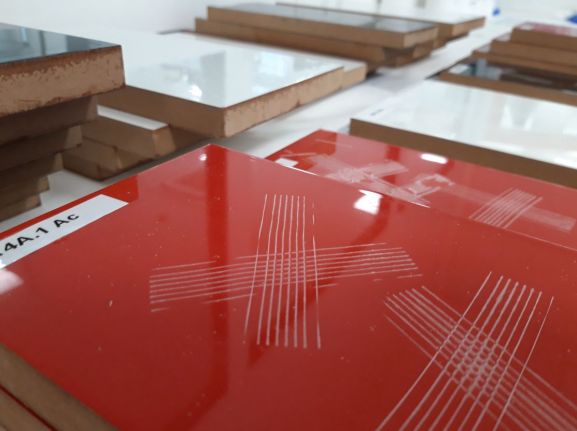The UV system solves adhesion problems in plastic surfaces and has environmental benefits
TECNALIA is currently developing a photopolymerising system for plastic surfaces (particularly for melamine boards). The system, which uses UV curing, increases the adherence of the materials, gives a gloss or matte finish to meet customer demands, and delivers the physical and mechanical properties required to meet furniture specifications.
Synthetic plastic surfaces, such as those used in melamine boards, are a common feature in furniture manufacturing. The boards are manufactured using pressure and heat to press wood particles together, resulting in a highly porous surface that presents adhesion problems when coating materials are applied.
Although the boards are designed not to be varnished, they are often varnished or lacquered for the pieces of furniture to have higher quality appearance and, thus, greater added value in the final product. Our new UV system solves these adhesion problems, helping to protect decorative plastic surfaces, and also offers environmental benefits.
- Varnishing on melamine board using solvent-based process (3-layer application system) = 200-500 g/l VOC emitted using the SOLVENT-based system.
- Varnishing on melamine board using PROALSIN UV process (3-layer application system) = 0-50 g/l VOC emitted using the UV PROALSIN system.
Under the PROALSIN initiative, the IRURENA GROUP can offer a versatile photopolymerisation system to be used for varnishing synthetic surfaces (primarily melamine) on UV curing production lines.
Further information
The project was launched in 2018, as part of the HAZITEK programme promoted by the Basque Government Department for Economic Development and Competitiveness and headed by the IRURENA GROUP and TECNALIA.
PROALSIN focuses on developing a complete photopolymerising system, covering Priming, Base and Finishing. VOC-free products that are also exempt from the ADR treaty, being high-solids products for coating and finishing difficult-to-varnish synthetic surfaces.
*Volatile organic compounds (VOC) are organic compounds ("Organic compound" means any compound containing at least the element carbon and one or more of hydrogen, oxygen, sulphur, phosphorus, silicon, nitrogen, or a halogen, with the exception of carbon oxides and inorganic carbonates and bicarbonates) which, as defined under Article 2 of Directive 2004/42/CE, have an initial boiling point less than or equal to 250°C measured at a standard pressure of 101.3 kPa (meaning that they evaporate easily at temperatures beneath their boiling point: e.g. benzene).
*ADR or European Agreement concerning the International Carriage of Dangerous Goods by Road, is a European treaty that governs the transport of dangerous goods by road. The ADR was concluded under the aegis of the United Nations and applies in Spain since the country signed the treaty on 19 October 1972. Most European countries are party to the treaty, as well as many other across Asia and North Africa. The most recent amendment to the ADR entered into force in 2015; further revisions are planned every two years (in odd years). The treaty regulates the packaging, carriage, documentation and other aspects for the road transport of dangerous goods, including their loading, unloading and storage, whether they are transported between different countries or within a single territory. An important aspect of the ADR is that it defines the duties and responsibilities of every party involved in the transport operation, with the aim of preventing damage to persons and protecting the environment.

